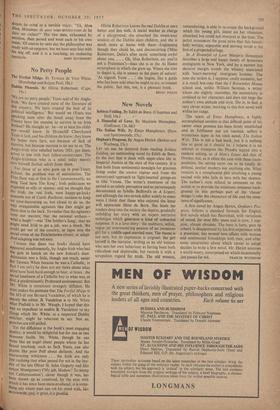No Petty People
'WE are no petty people,' Yeats said of the Anglo- Irish. 'We have created most of the literature of this country. We have created the best of its political intelligence.' But would we (Yeats was speaking soon after the break away from the Union) have the stamina to survive in an Irish Ireland? He thought so : he—or at least his child- ren—would know. In Drumcliff Churchyard Yeats is laid, and his children do know; they know his hopes were liars, not because of lack of stamina, but because stamina is no use to us. The Anglo-Irish who rebelled before 1921, put them- selves in line with their fellow-countrymen. The Anglo-lrishman who is a rebel today merely ems himself farther adrift from them.
For those of us who grew up in post-Treaty Ireland, the problem was of assimilation. The Free State was at first in the Commonwealth; we sang 'God Save The King'; Irish politicians we regarded as silly or sinister; and we thought that the Irish, the real Irish, were happy-go-lucky Peasants out of Castle Rackrent, anxious to keep on your-honouring us, but afraid to do so, the way irresponsible agitators like Dev might get them shot in the back. To realise that the agitators were our masters; that the national anthem— What a laugh !—was 'The Soldier's Song'; that we might need Irish to get a job, was a shock. We could get out of the country; or lapse into the social coma of the Punchestown circuit; or adapt. And adapting was not easy.
Curious that these two books should have appeared simultaneously, by Anglo-Irish who had the guts to knock on the new Ireland's door. Admission was a little, though not much, easier for Terence White because he was a Catholic; in fact I am sorry he does not say more about what must have been hard enough to bear, at times: the social loneliness of a Catholic boy in what was, at first, a predominantly Protestant environment. But Mr, White is sometimes strangely diffident. He even makes the pretence that The Fretful Midge is the MS of one Bernard Vandeleur, of which he is Merely the editor. B. Vandeleur is to Mr. White What Pinfold is to Mr. Waugh; I hoped that this Was an expedient to enable B. Vandeleur to say things which Mr. White, as a respected Dublin solicitor, might be reluctant to say. Not so; punches are still pulled.
Yet the diffidence is the book's most engaging quality; it would be delightful but for one or two tiresome faults. Mr. White, though he can write like an angel about people whom he has found touching, such as Jack Yeats, can also prattle like poor Poll about dullards. And the excruciating witticisms . . . the Irish are only lost realising that what passed for wit in the hey- day of the late Oliver St. John Gogarty and film censor Montgomery (`My job, Madam? To stamp out Californication'), clever though it was, has been shown up as contrived, by the ease with Which it has since been mass-produced; it is some- thing any astute man can rot his mind with, like crosswords; and, in print, it is painful. Olivia Robertson knows the real Dublin at once better and less well. A social worker in charge of a playground, she absorbed the sweet-sour wisdom of the Dublin slum children, and she is much more at home with them—frightening though they cbuld be, and disconcerting (`Miss Robertson, Delia's after sayin' something awful about you. . , . Oh, Miss Robertson, say you're not a Protestant')—than she is in the At Home atmosphere in which she grew up. Where she tries to depict it, she is uneasy to the point of naivete; 'As regards Yeats . . .' she begins, like a guide who has been told what he ought to say, to interest the public. But this, too, is a pleasant book.
BRIAN INGLIS


































 Previous page
Previous page